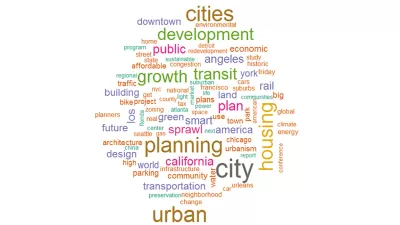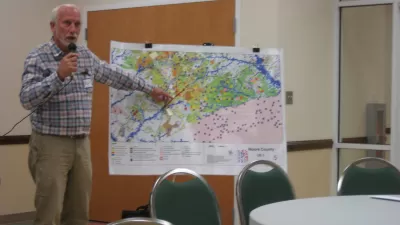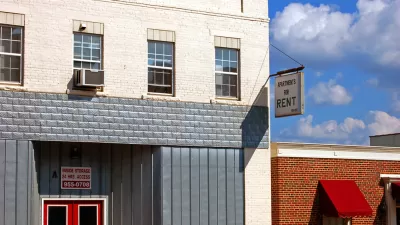United States
Highway Trust Fund Projected to Become Insolvent Earlier than Expected
As we've noted numerous times, the Highway Trust Fund will become insolvent around the end of the fiscal year - Sept. 30, just when MAP-21, the transportation authorization bill, expires. We were wrong. The new HTF "ticker" explains the bad news.

What Is Popular Planning? 13 Years of Planetizen
A chronicle of the evolution of popular planning, drawn from data collected from the long history of Planetizen as a forum for discussion and reporting.
Obama's Directive to EPA: Trucks to Get Leaner
Over strong objections from some auto and truck manufacturers, President Obama directed EPA to develop new fuel efficiency regulations for medium and heavy-duty trucks by March 2016 as part of his administration's effort to reduce carbon emissions.
The Best Complete Streets Programs of 2013
More than 80 communities adopted complete streets policies in 2013, bringing the national total to 610 jurisdictions with such policies. The National Complete Streets Coalition examined the newest programs for the best examples.
Does Reducing Regulations Yield Expanded Housing Options?
Outdated and onerous regulations, particularly those found in zoning ordinances, are affecting the availability of housing choice. What can communities do to expand their hosing stock? C.J. Gabbe explains.
Looking Back on the 5th Anniversary of the Federal Stimulus
The American Recovery and Reinvestment Act (ARRA) was signed into law on February 17, 2009, less than a month into President Obama's first term. The Council of Economic Advisers recently presented its final quarterly report on ARRA's impacts.
Stick With Diesel, Climate Experts Tell Truckers and Transit Agencies
So much for switching from diesel fuel to natural gas to protect the environment. A new report concludes that it is best to stick with oil-based fuels because methane leakage from natural gas is much greater than currently estimated.

The Cost of the ‘Yuppie’ Lifestyle
Locality (a self-described "local business search site") has ranked the cost of living for the “yuppie” lifestyle in every American city. It’s no surprise that San Francisco tops the list, but how do 29 cities rank on the "Yuppie Price Index"?
Felony Suspected at North Carolina Coal Ash Spill
The Feb. 2 spill of coal ash slurry from a Duke Energy containment pond has taken a new turn with a federal grand jury issuing subpoenas for records from both Duke Energy and the state environmental regulator.

Libraries Remain Central to Communities
A recent study by the Pew Research Center shows that despite the increasing use of tablets and e-readers, Americans still love books and still rely on libraries as a central cultural institution.
Game Changer for Housing Nonprofits: REITs
Tired of not closing deals to preserve affordable housing due to delays in public financing, the nonprofit Housing Partnership Network created a real estate investment trust. The results have been "game changing."
Mapped Snow Routes Reveal the Logic of Transportation Infrastructure
A side-by side-comparison of several cities’ snow routes reveals the inherent logic (or lack thereof) of their transportation infrastructure.

4 Steps to Highly Engaging Plan Documents
Plan documents tend to be static, long, and—let's face it—boring. See how three planning organizations started thinking outside the PDF box to encourage more informed citizen participation.
Business and Labor Agree: Boost the Gas Tax
At a Senate Environment and Public Works Committee meeting on Feb. 12, leaders from big labor, big business, AASHTO, and AMTRAK testified to the importance of keeping the Highway Trust Fund solvent. The first two specified increasing the gas tax.
College Campuses as Multi-Modal Models for Cities
A new report argues that city governments have some of the same incentives for de-emphasizing single-occupant commuters as colleges—such as attracting younger workers and freeing up land used for parking.

Overcoming the Myths of the Rental Housing Market
A recent study called “America’s Rental Housing: Evolving Markets and Needs” by the Joint Center for Housing Studies at Harvard smashes myths about the rental market—of particular importance given the recent rise in rents around the country.
Peak Sprawl Happened—20 Years Ago
Analysis of the USDA’s 2010 National Resources Inventory, which tracks land use, shows the growth rate of suburban sprawl peaking in the mid-1990s, declining by two-thirds since then, even through the most recent housing boom. How did that happen?
City Visas: The Right Way to Lure Talent?
Should dying cities like Detroit get their own visa programs to attract skilled foreign workers? What about prosperous cities like New York and London?
Big Oil vs. Big Corn in Transportation Fuels Fight
Say what you will about growing corn for fuel, and there are many criticisms even coming from the environmental community, corn ethanol has its benefits, and one of the most important is reducing oil's stranglehold on America's transportaton fuels.
What 'Second Cities' Teach About Branding
A recent news broadcast showed the mayor of Tacoma with a backdrop of the city of Seattle. The feeling of being hidden in the shadow of larger, older neighbor cities is familiar all over the world, but what are “kid sister” cities to do about it?
Urban Design for Planners 1: Software Tools
This six-course series explores essential urban design concepts using open source software and equips planners with the tools they need to participate fully in the urban design process.
Planning for Universal Design
Learn the tools for implementing Universal Design in planning regulations.
planning NEXT
Appalachian Highlands Housing Partners
Mpact (founded as Rail~Volution)
City of Camden Redevelopment Agency
City of Astoria
City of Portland
City of Laramie


































